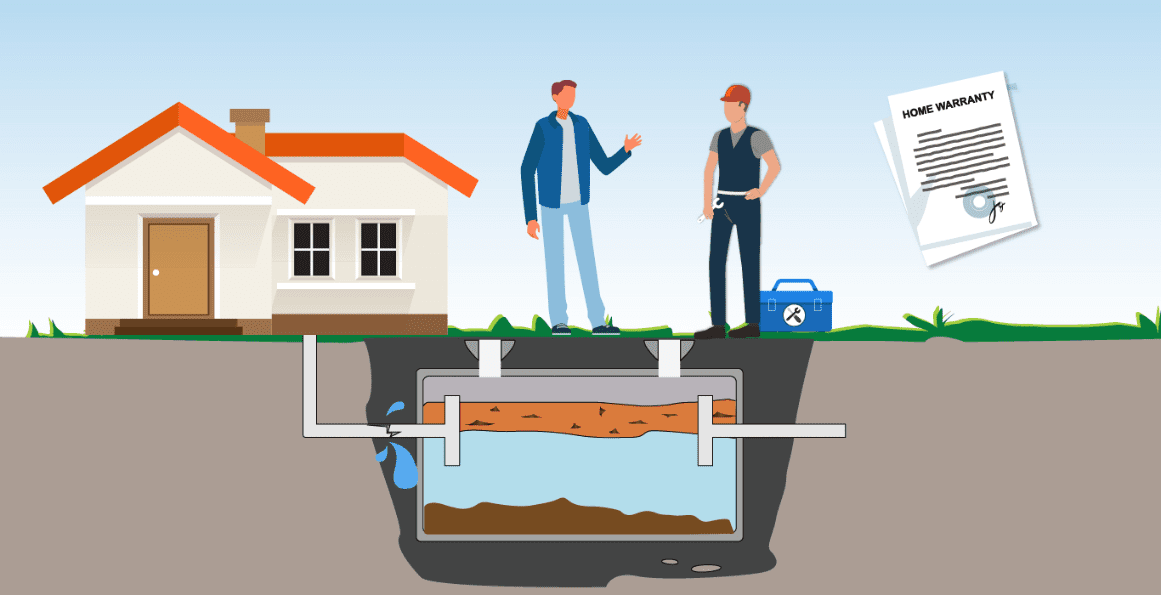
Septic systems are rarely considered while they are running well, but it is critical to get them repaired when anything goes wrong to provide your peace of mind. The Home Media reviews team discusses many alternatives for protecting your septic system, including our top selections for firms, in this post.
For a short time, most septic systems are protect by a manufacturer’s guarantee for problems like product defects. Septic tank manufacturers, for example, often give a one-year guarantee on the tank itself. If the tank fails during the first year of installation and was properly install, you are entitle to a repair or replacement from the manufacturer. You may not be cover beyond that year, so you should consider purchasing a home warranty, which covers a range of important home systems and appliances (typically septic coverage is an add-on to a home warranty). A home warranty plan can help you extend the life of your septic system by sending a specialist to your house to perform repairs after a breakdown or malfunction, but it’s not always worth the money. A septic system should last 15–20 years if properly maintained.
Septic system warranties coverage
Septic coverage is often available as an extra add-on with most home warranty programmes. After you purchase your home warranty, you may add septic system coverage for a few dollars more each month. Instead of merely protecting your septic system, a home warranty may also cover your house’s most vital appliances and systems.
Best Home Warranties
We have included some of the top-rated home warranty providers and what they cover in septic systems to help you choose from the numerous options available. These firms provide low rates, deductibles, and customer support that is available 24 hours a day, seven days a week.
- American Home Shield: AHS provides three plans, and you may add septic system coverage to any of them for an extra $5 each month. They encompass sewage rejector pumps, mainline stoppages, and septic tank backups for septic systems. If you want full coverage, their Platinum Plan with the septic system add-on is a wonderful price. It should be note that AHS will pay up to $500 for system diagnostics, repair, and replacement during the period.
- Choice Home Warranty: For an extra $10 per month, you can add coverage for septic systems and septic system pumping to any of their plans. In the septic system coverage, they include a jet pump, sewage ejector pump, aerobic pump, septic tank, and septic line from your residence. During the contract duration, CHW will pay up to $500 for septic system repairs.
- Select Home Warranty: Septic systems are available as an extra coverage option with all three plans for $6 per month. Their septic system includes a jet pump, a sewage ejector, a septic tank, and an aerobic pump. During the contract duration, the septic system repair or replacement is limit to $400.
- ServicePlus Home Warranty: Septic system and septic tank pumping are available as optional coverage with both ServicePlus plans. They cover sewage ejector pumps, jet pumps, aerobic pumps, and blockage clearance under septic systems. According to their service contract, they will pay up to $500 throughout the period for septic system diagnostics, repair, or replacement.
- Cinch Home Services: Septic systems are available as an optional add-on with all three models from Cinch. They will go over mainline shutdowns, pumping, and sewage ejector pumps. Cinch limits the monetary compensation for pumping to $500 each visit. The maximum for tank replacement to $1000 over the contract duration.
Septic Warranty Is Necessary
Your septic system should last 15–20 years with good care and maintenance, with particularly well-maintained systems lasting 40 years. This does not, however, mean that your septic tank will not experience the occasional failure or malfunction. If your system’s septic sewage ejector pump breaks or another component stops operating. Expert service and a septic system repair or replacement may be require.
While a septic warranty can provide coverage for your system. It may be limit in duration and will only protect your sewage system. In contrast, a house warranty covers all main home systems and appliances, including septic systems. Property warranties will cover costly septic system repairs and replacements. It will send a reputable professional to your home to conduct the required repairs as soon as possible.
Choose Top Septic Warranty
Consider the following variables while looking for the finest septic system coverage:
- Pick the correct sort of plan: Most home warranty providers will offer a number of programmes from which to choose. A systems plan, an appliances plan, and a combination plan are all examples of common home warranty policies. Choose a systems plan or a combination plan for septic system coverage. By selecting one of these coverage choices, you can assure that your septic system will be protect.
- Compare prices: Septic warranty coverage is often offer as an add-on by home warranty providers. Before making a final selection, compare the add-on price of at least three firms.
Check for coverage exclusions. Most home warranty providers do not cover drain field pipe replacement, routine maintenance pumping, or septic tank waste disposal.
Take care of your septic system
Even if you have a septic warranty, the most efficient approach to avoid costly damage is to practise basic maintenance. Regular inspections and residential septic pumping will keep your system in good working order. You’ll also be able to detect any emerging faults, spotting problems before they become pricey replacements.
A professional septic provider should examine your septic system at least every three years. A septic system should be inspect more regularly in larger homes or those with greater water activity, such as a family with young children taking baths and requiring to launder clothing more frequently. Every year, septic systems with mechanical parts or electrical float switches should be examine. A residential septic pumping should be done every three to five years. Your septic service provider may advise you on how frequently your system should be examine and pump. Keep detailed documents of your system, such as a diagram, property map, and a journal of prior septic system repairs.
Every drop of water utilised in your home’s plumbing ends up in your septic system. The less water that enters the system, the more effectively the system will break down wastewater into the soil. You may extend the life of your septic system by reducing water waste. To decrease water consumption when using the restroom, consider replacing inefficient toilets with high-efficiency versions. You may also get energy-efficient shower heads and tap aerators to help you save water. Some businesses and organisations even provide free kits containing these things. When doing laundry, choose the proper load size to prevent using more water than is necessary to clean your garments.
Everything you flush down the toilet, pour down the bathroom or kitchen sink, or wash down the shower drain ends up in your septic system. Understanding what can and cannot be put into a septic system will help it last longer. Cooking oil or grease, coffee grounds, cigarette butts, or feminine hygiene products should never be washed down the drain or toilet. Dental floss, flushable wipes, and paper towels are among more lesser-known products that should never end up in your septic tank. As far as possible, avoid putting household chemicals in your plumbing. For example, instead of using a harsh chemical to unclog a pipe, use a drain snake. Even items that claim to be safe for septic systems might cause problems if used excessively.
One of the most significant parts of a septic system is the septic drain field. The discharged wastewater penetrates the soil in this leach region to naturally degrade and eliminate pollutants. After passing through the procedure, this water contributes to the replenishment of groundwater in the soil. Maintain the condition of your drain field by never parking or driving automobiles or heavy equipment across it. When planting trees and plants with thick roots, ensure sure they are put far enough away from the leach field. Because too much water delays or prevents a drain field’s natural wastewater treatment, avoid introducing extra water to the region, such as gutter runoff.
Home Warranty Is Worth for Septic Systems
Why would you think about getting a house warranty for your septic system? Household warranties often cover items such as the heating system, electrical system, and basic plumbing, as well as home equipment such as refrigerators, dishwashers, cooktops, and even your ice machine and trash disposal.
But is it worth it to add septic system coverage if they won’t rebuild the entire system? The answer is determined by the age of the house as well as the septic system. A house warranty can be a great option, especially for an older home with an original septic system. The last thing you want is an issue with this possibly odorous and disgusting part of homeownership. A plumbing breakdown is not for the faint of heart. A reliable home warranty company may be a huge help in such situations. Because, aside from replacement, septic system repairs can be prohibitively expensive. It’s important to have some peace of mind knowing that all main systems are protected. Because when septic systems fail, things may go horribly wrong!
What about buying a new house? Home purchasers should be aware that new construction is protected by a builder’s limited warranty, and a new septic system should be covered by the installer’s guarantee, so you will be covered in the event of a malfunction.
What about homeowner’s insurance, though? It’s useful to grasp the distinction between a house warranty and homeowners insurance. This is the distinction between normal wear and tear (home warranty) and unintentional damage (insurance policy.)
A house warranty will cover things that insurance will not cover, but the coverage is not infinite, so read the small print on your home warranty carefully to understand the types of wear and tear on your septic system that will be covered. So, especially for an older property with a septic system that is no longer covered by the installer’s warranty (assuming you even know who installed it and they are still in business! ), septic system coverage might be beneficial. When something goes wrong with a septic system, it really goes wrong, so being financially insured may save you money and frustration.
Methodology for Septic Systems
Because our customers rely on us to offer impartial and reliable information, we developed a detailed grading methodology to develop our rankings of the best home warranty providers. This approach takes into account a variety of rating parameters, and we collect data on hundreds of home warranty providers to grade them on each element. The end result is a cumulative score for each provider – the organisations with the most points are at the top of the list.
To ensure that our research is as complete as possible, we phone each major home warranty provider directly and chat with personnel to obtain prices, specifics on coverage options, availability according on region, and other information. We also go over example contracts to have a better understanding of what each plan provides and to identify any limits. Furthermore, we mimic the process of contacting each company’s customer support staff in order to assess their level of helpfulness and problem-solving abilities.
Bottom line
While a manufacturer’s warranty can provide some septic system protection, a house warranty with a septic system add-on provides a more complete degree of protection for your property. Home warranties cover the expense of ordinary wear and tear on numerous systems and appliances, and homeowners can choose varying levels of coverage based on their requirements.
Also Check:
Famous Young Entrepreneurs Stories
Investing In Wine: Where You Should Start 2022



